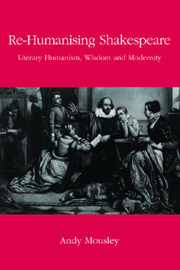Book contents
7 - Humility: Love's Labour's Lost
from Part II - How to Live
Published online by Cambridge University Press: 12 September 2012
Summary
I suggested in the previous chapter that Coriolanus is a levelling play, a play that brings Coriolanus down to earth and forces him to recognise his ‘only human’ needs and vulnerabilities. This chapter will take up the theme of levelling and direct it towards the matter of living humbly, with a healthy sense of one's own folly. As the chapter proceeds, it will draw connections between humility, folly and the conditions for being taken seriously as a lover. This will prepare the way for Chapter 8, which will examine the intimate connection in As You Like It between living well and loving well.
The natural home for the ‘only human’ is comedy, for comedy routinely substitutes elevated human realities for ordinary or base ones. A classic comic moment, from this point of view, is the Eastcheap tavern scene in I Henry IV in which Falstaff and Hal engage in role-play and improvise by using the objects around them:
Prince Harry: Do thou stand for my father, and examine me upon the particulars of my life.
Sir John: Shall I? Content. This chair shall be my state, this dagger my sceptre, and this cushion my crown.
He sits
Prince Harry: Thy state is taken for a joint-stool, thy golden sceptre for a leaden dagger, and thy precious rich crown for a pitiful bald crown.
(II, v, 379–85)The irreverent use of a cushion to represent a crown has the effect of deconsecrating kingship and of implying that monarchs are ordinary human beings rather than ‘more than human’ individuals.
- Type
- Chapter
- Information
- Re-Humanising ShakespeareLiterary Humanism Wisdom and Modernity, pp. 128 - 139Publisher: Edinburgh University PressPrint publication year: 2007

